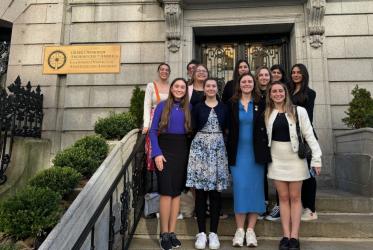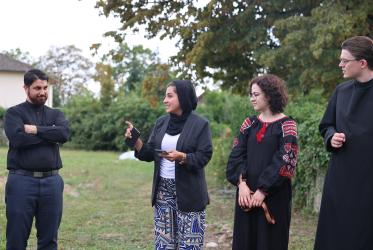Eighteen-year-old Asha Smith has a vision for changing laws that lead to injustice. In some ways, she is just beginning her life pilgrimage. While studying law at American University in Washington, DC, she serves as a youth intern for the Church Federation of Greater Indianapolis (USA), her home community.
This week, on a break from her studies, she is also an intern for the World Student Christian Federation (WSCF) and an official observer at the World Council of Churches (WCC) Central Committee meeting being held 2-8 July in Geneva.
One of her projects has been interviewing young people to collect the observations and thoughts of the young participants on video as she observes the proceedings.
Smith ties her goal of practicing law with her passion for ecumenical work. “My belief is that law provides a unique opportunity to change the system, which relates to many issues of vital concern to the ecumenical movement.”
Diversity should include all ages
Observing and interacting with the Central Committee, a WCC governing body, she reflected on the rich diversity of countries and faith traditions that are represented. “It's rare that you get the opportunity to meet people with so many different perspectives,” she said. But Smith wishes there were more diversity in the ages of people who serve on the committee.
She believes more participation from youth and young adults would widen the WCC's perspective even more. “I think there are a lot of people who want the youth involved, but not as many who are committed to it,” she said.
She suggested that the WCC create even more forums and discussions that would open up the floor for ideas from youth. The Central Committee has eight youth advisors in addition to the young adults who are full members of the committee. In addition, 24 stewards representing 20 different countries are helping to facilitate the meeting.
“The WCC is already on the right track for youth,” she said, “but sometimes we forget all aspects of diversity. We have plenty of racial, language and ethnic diversity but not as much in terms of age diversity.”
Smith has family ties to the Central Committee: her mother is the Rev. Dr Angelique Walker-Smith, a Central Committee member. Both women are members of the National Baptist Convention USA, Inc.
Walker-Smith became a familiar face to thousands of people who attended or watched coverage of the WCC 10th Assembly in the Republic of Korea last year as she hosted a daily news video show that captured the highlights of the assembly.
Smith admires her mother's accomplishments, she said. “In some ways I have been following in her footsteps. I admire her confidence and the way she tries to move forward a new social agenda. We both feel strongly about women's rights. I've learned a lot from her, but also I believe I will pursue social justice in a different way.”
As Smith pays particular attention to the participation and role of young people at the WCC Central Committee, her reflections will be shared at the WSCF's General Assembly in Bogota on 15-21 August. The theme of the assembly is “We are Many, We are One - Sent out to build God’s Peace.”
The WSCF is called to engage students in peace-building, said Christine Housel, WSCF general secretary, participating in the Central Committee as an ecumenical advisor. “We are hoping that our assembly will provide ways of engaging students in the framework of the pilgrimage of justice and peace as we continue to work to strengthen the strategic partnership between the churches and student movement in the ecumenical formation of students and young adults,” she said.





